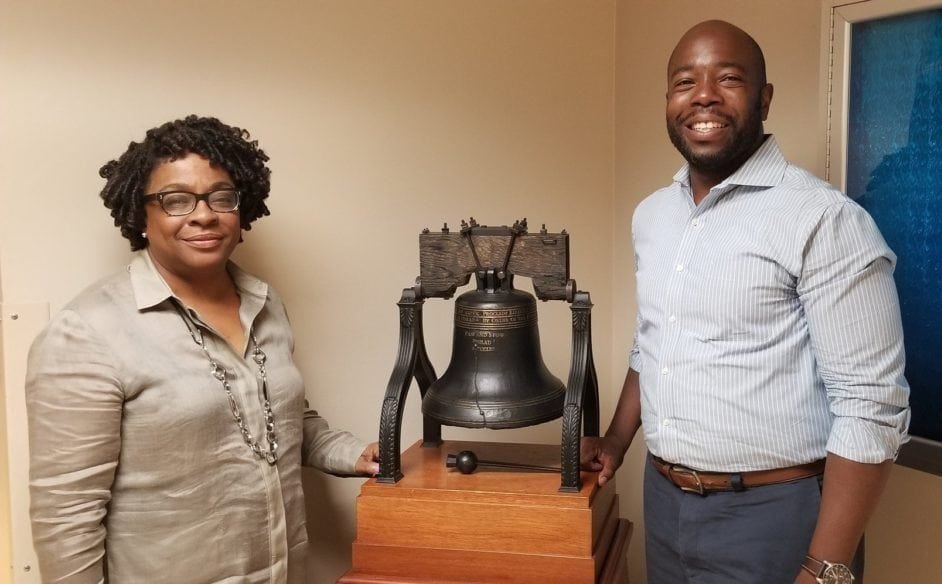For the one in four Philadelphians living below the poverty line, a jump into the technology sector — a high-opportunity area thought to be key to reducing levels of poverty — could be transformative.
And despite Philly’s rise among national rankings of startup towns and the growth tech-sector employment has enjoyed, hiring managers still say they struggle to fill the jobs they need.
Enter a group of some 30 Philly tech stakeholders who, since June 4, have been meeting with the City of Philadelphia’s Office of Workforce Development. They’re a key element of the city’s Tech Industry Partnership, the first of its kind to come together, and they’re tasked with raising a bridge between those two groups: potential staffers who might have their lives uplifted by a career change and the tech employers who are looking to hire them.
“TECH IP” is led by Barry Wilkins, City Hall’s director of industry partnerships. It’s one of the elements in the city’s workforce development strategy launched in February from the newly-created office, with Sheila Ireland as executive director. Its mission: to strengthen Philly’s overall economic vitality by helping align job demand and workforce skills in technology.
Ireland previously led the celebrated West Philadelphia Skills Initiative at the University City District.
“The beauty is that, for the first time in this city’s history you’ve had that breadth of players — labor, education, industry — coming together and really focusing on the issue of connecting Philadelphians to work,” Ireland, a Chicago native who previously spent over a decade working for the City of Philadelphia, told Technical.ly. “I think there have been spaces where we’ve tried but never a scenario where you put the major systems leader in a room to try and come up with collaborative solutions.”
Who from the tech community will you find in that room?
It’s mostly names you might have read on this website before, like TechGirlz founder Tracey Welson-Rossman, Arcweb Technologies CEO Chris Cera, Stimulus founder Tiffanie Stanard, Digitability founder Michele McKeone, Sweat EquitE Managing Principal Darla Wolfe, Brick Simple’s Thomas Whaley and Det Ansin and People Metrics COO David Rode.
The one member outside the tech sphere is Economy League of Philadelphia Managing Director Nick Frontino, who Wilkins credits with providing key research insight to shape the group’s contributions.

At Ireland’s office at 1515 Arch St., she speaks passionately about taking an employer-first approach to develop workforce development strategies, echoing the initial processes that led the West Philadelphia Skills Initiative to be recognized by the Brookings Institute as a replicable model.
“It’s very much about meeting individuals where they are and building a system that takes them as far as their talent and ambition will allow them to be,” Ireland said. “We want to create a system that is more realistic about the way peoples lives educative processes and work life really works. The myth of work is that your path follows a straight line, but the reality is that everybody’s career goes like this,” she said as she painted an imaginary squiggly line in the air.
Building off of data from the Economy League, tech was identified among seven industries for the potential to lift people out of poverty. The first convening took place in April, with a preliminary meeting of 160 C-suite tech execs.
On June 4, with help from California-based SMALLIFY — an “innovation capacity-building firm” that runs innovation workshops — the group got to work on early sketches of ideas to help develop Philly’s tech workforce.
“In general, the theme so far has very much been about engagement,” said Wilkins. “How do you demystify tech to underrepresented communities? And what is the data telling us to do?”
Ever the requisite for modern decision-making, one of the first ideas from the group on how to deliver on its mission is the creation of a platform that can provide real-time data on employment, to better understand what employers in tech are looking for.
Another, perhaps more transformative early prototype has to do with creating neighborhood technology groups, harnessing each Philly cardinal point’s challenges and natural attributes to solve problems.
“In North Philly, for example, data tells us there are some pretty bad health problems, high blood pressure, diabetes,” said Wilkins. “There might be a natural synergy with anchor institutions there to solve real challenges the community is facing and you can bring in the whole community to be part of that conversation.”

Wilkins, who comes from the finance sector, said the city was deliberate about choosing tech as one of the industries for the partnership. In fact, it’s the first one to come together, with healthcare and financial services among the following spaces to get their own IP.
“It’s not a knee-jerk reaction,” Wilkins said. “We partnered with the Economy League to help us figure out the best places to help move people into family-sustaining wages and careers. There’s a wide range of jobs for folks, especially people that may not have a four-year degree.”
(That last line was found to be key to expanding workforce access in Albuquerque, N.M. As part of a skills-based hiring push called Talent ABQ, the requirement of a college diploma was increasingly deemphasized in city job postings, opting instead for competency tests. Two years later, the City of Albuquerque had hired some 500 municipal workers through the skills-based approach.)
One specific example of a job not requiring a college degree is that of a control room technician, one who monitors equipment and performs troubleshooting. Per online salary tracking website Paysa, the average national salary for a position like that one is around $45,000. It requires some on-the-job-training, good emotional intelligence and some certifications. What it doesn’t require is a college degree.
“When you’re the big institution, sometimes that barrier is just there to filter the thousands of applications you get for one position,” Ireland said. “At the ground level, small and medium firms don’t have the same barriers. They want to know what you can do, they’re not looking for degrees.”
Small tech firms, Wilkins said, might have more encouragement to roll down those barriers, specially when duking it out against larger employers like Comcast. High turnover in tech adds urgency to the need to find and retain qualified talent: the sector features the highest turnover rate (at 13.2 percent), according to a 2017 LinkedIn study.
“They have to be more creative in terms of the talent they look at,” Wilkins said of smaller tech firms.
The next move for the push, still in its infancy, is looking at the data and early feedback from the stakeholders to draft strategic plans. The projected deadline for those sketches is mid-September, and they will be connected to the broader workforce development strategy.
###
Whatever the approach is, it’s going to take a collective effort to move the needle, said founding partnership member Tracey Welson-Rossman.
“There are challenges and obstacles all along the tech workforce development pipeline,” the technologist said. “From educating our children in technology skills…to a mismatch of what is taught at most colleges versus the job openings in companies, to a lack of understanding of what today’s technology jobs are and the skills they entail. Collaboration, investment and some patience are the ingredients we need.”
Darla Wolfe, principal at SweatEquitE, also mentioned the push to create tech entry points that don’t require a college education.
“It’s important to stoke tech interest in our workforce and let people know that tech careers are possible and entry level positions are reachable without four-year degrees,” said Wolfe, who co-organizes Philly New Tech Meetup. “It’s important for Philadelphians to feel engaged and excited, not overwhelmed by tech.”
But for Sylvester Mobley, founder of Coded by Kids, a challenge for the initiative is to look past the jobs that pay the lowest salaries in tech and creating a throughline to highly skilled positions.
“The devil is in the details,” said Mobley at this year’s RAIN Conference, when asked about the tech industry partnership by this reporter during the Q&A session. “Often the target for these type of programs is black people getting all the low-paying jobs in tech, and my push is always: if you’re going to do it, do it right.”
The Iraq War veteran, who founded Coded by Kids in 2014 to provide coding skills to kids in underserved communities, joined the initial convening of stakeholders for the broader workforce development strategy.
“Don’t group people of color into the low-paying jobs,” Mobley warned.
Regardless of skill level, if tech careers are going to help the city lower its poverty rates, then companies need to ensure potential employees are welcomed as a culture add, rather than strive to become a culture fit, said Stimulus founder Tiffanie Stanard.
“Tech careers can reduce levels of poverty because those jobs can be flexible, sometimes remote and not need a traditional education background, allowing the employees to take care of their families in various ways,” Stanard said. “But only if those employees feel comfortable enough to stay in those jobs long-term, and that it where the culture add vs. the culture fit comes in. There is nothing worse than having a good paying job but you feel uncomfortable (or unwanted) every day.”







